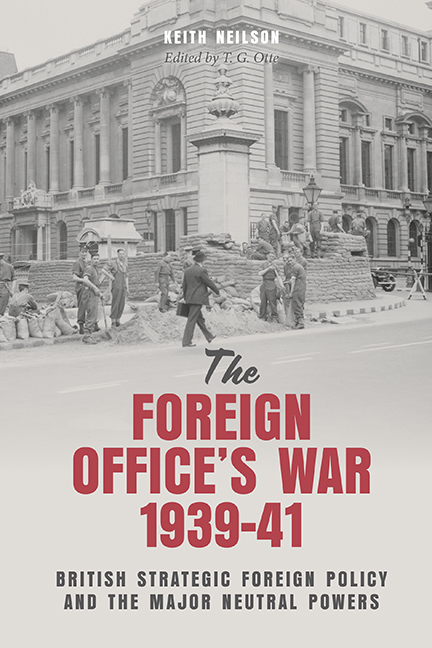Book contents
- Frontmatter
- Contents
- Preface and Acknowledgments
- List of Abbreviations
- Introduction: Keith Neilson and Modern International History
- 1 On the Eve of War: January to September 1939
- 2 The Baltic, Blockade and Soviet Russia: September 1939–June 1940
- 3 Defending the Mediterranean: Italy, Russia and the Balkans, September 1939–June 1940
- 4 Defending Britain and the Far East: The United States, Japan and Soviet Russia, September 1939–June 1940
- 5 ‘Nothing for nothing’: From the Fall of France to Operation Barbarossa: July 1940–June 1941
- Epilogue
- Appendix I Members of the American, Central, Eastern, Far Eastern, Northern and Southern Departments, 1939–41
- Appendix II Dramatis Personae
- Appendix III Keith Neilson, List of Publications
- Bibliography
- Index
2 - The Baltic, Blockade and Soviet Russia: September 1939–June 1940
Published online by Cambridge University Press: 16 July 2022
- Frontmatter
- Contents
- Preface and Acknowledgments
- List of Abbreviations
- Introduction: Keith Neilson and Modern International History
- 1 On the Eve of War: January to September 1939
- 2 The Baltic, Blockade and Soviet Russia: September 1939–June 1940
- 3 Defending the Mediterranean: Italy, Russia and the Balkans, September 1939–June 1940
- 4 Defending Britain and the Far East: The United States, Japan and Soviet Russia, September 1939–June 1940
- 5 ‘Nothing for nothing’: From the Fall of France to Operation Barbarossa: July 1940–June 1941
- Epilogue
- Appendix I Members of the American, Central, Eastern, Far Eastern, Northern and Southern Departments, 1939–41
- Appendix II Dramatis Personae
- Appendix III Keith Neilson, List of Publications
- Bibliography
- Index
Summary
On the outbreak of war, it was vital that the conflict be contained as much as possible. In Europe, one of the most important regions was the Baltic. The key to limiting the war in that area was Soviet Russia. The Soviet invasion of Poland on 17 September and subsequent attack on Finland on 30 November made the Baltic an area of concern for British strategic foreign policy, and a knowledge of Soviet intentions an important issue in British policy. But that was not the limit of Soviet influence. Soviet Russia was also important with regard to British plans for blockade. The British desire to strangle the German economic war effort threatened to be vitiated by the steady flow of vital raw materials into the Reich from Soviet Russia. Much of British policy with regard to Moscow was designed to limit the extent of the breach as much as possible. Underlying all of the British desires was the hope that Soviet Russia could be weaned away from Germany, obviating the worst effects of the Nazi-Soviet Pact.
THIS ‘RUSSIAN MONSTROSITY’: THE NAZI-SOVIET PACT AND ITS AFTERMATH, AUGUST–OCTOBER 1939
This latter was important. In the aftermath of the Nazi-Soviet Pact and before the war itself began, the ‘world’, Halifax remarked, ‘looks very black’. In this darkened Europe, the Foreign Office attempted to discover just what that agreement portended. Its Far Eastern ramifications will be discussed in a later chapter, but there was immediate speculation as to its impact on Europe. A conversation with a well-informed Czech journalist spurred concerns about the future of Eastern Europe. The belief was that the Nazi-Soviet Pact adumbrated the formation of a ‘Congress Poland’, which would serve as an ‘uneasy buffer’ between the two aggrandising states. In the absence of any definitive knowledge of the secret protocols of the Pact, it was assumed that Latvia and Estonia were to be allocated to Soviet Russia and that Moscow would be given a ‘free hand’ in Finland.
In its retrospective analysis of the reasons behind Soviet Russia's signing of the agreement with Germany, the Foreign Office was convinced that Moscow had made a bad bargain. Explaining why the Foreign Office had not anticipated the Ribbentrop-Molotov Pact, Laurence Collier's view reflected long-standing beliefs in the Foreign Office.
- Type
- Chapter
- Information
- The Foreign Office's War, 1939-41British Strategic Foreign Policy and the Major Neutral Powers, pp. 83 - 126Publisher: Boydell & BrewerPrint publication year: 2022



